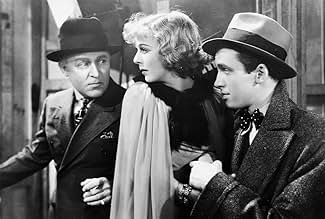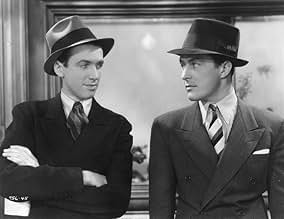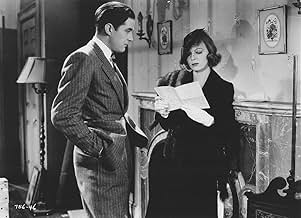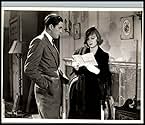AVALIAÇÃO DA IMDb
6,4/10
716
SUA AVALIAÇÃO
Adicionar um enredo no seu idiomaA young married couple's relationship becomes strained when he is assigned overseas as a foreign correspondent and she becomes a major stage star.A young married couple's relationship becomes strained when he is assigned overseas as a foreign correspondent and she becomes a major stage star.A young married couple's relationship becomes strained when he is assigned overseas as a foreign correspondent and she becomes a major stage star.
- Direção
- Roteiristas
- Artistas
- Prêmios
- 3 vitórias no total
Ray Milland
- Tommy Abbott
- (as Raymond Milland)
Ronnie Cosby
- Kit
- (as Ronald Cosbey)
Arthur Aylesworth
- Secretary
- (não creditado)
King Baggot
- Character man
- (não creditado)
Tommy Bond
- Pesky Kid
- (não creditado)
Harry C. Bradley
- Desk Clerk
- (não creditado)
Tyler Brooke
- Author
- (não creditado)
Daisy Bufford
- Maid
- (não creditado)
Jack Cheatham
- Taxi Driver
- (não creditado)
Jack Daley
- Conductor
- (não creditado)
John Dilson
- Stage Manager
- (não creditado)
Charles Fallon
- Prof. Dindet
- (não creditado)
Avaliações em destaque
In New York, the rookie newsman Christopher "Chris" Tyler (James Stewart) dreams on becoming a famous journalist. When his girlfriend Cicely (Margaret Sullavan) spends a couple of days with him, they decide to get married and Cicely leaves college. Chris's best friend Tommy Abbott (Raymond Milland) is his best man and becomes a family's friend. Chris has his great chance when his editor Frank Carteret (Robert McWade) sends him to Rome assigned as a foreign correspondent. Cicely stays in New York with Tommy and does not tell to Chris that she is pregnant. When she delivers the baby Kit, Chris celebrates and loses a big scoop and his boss fires him. Chris falls in disgrace and the couple has economic difficulties; however Tommy lends money to Cicely and offers an opportunity on the stage as an actress. Cicely is hired and becomes successful and Chris is depressed with the situation. Cicely seeks out Frank Carteret and explains the situation, and he offers a job opportunity to Chris in Russia. He accepts the job but Cicely stays in New York with their son. Along the years, their marriage ends with the distance, but they are still in love with each other.
"Next Time We Love" is a romantic melodrama ahead of time with a mature story of career conflict with marriage, causing separation, reconciliation and infidelity of the two leads. This theme is impressive for a 1936 movie, where usually the woman is submissive and dependable of man's possessions. My vote is seven.
Title (Brazil): "Amemos Outra Vez" ("We Love Again")
"Next Time We Love" is a romantic melodrama ahead of time with a mature story of career conflict with marriage, causing separation, reconciliation and infidelity of the two leads. This theme is impressive for a 1936 movie, where usually the woman is submissive and dependable of man's possessions. My vote is seven.
Title (Brazil): "Amemos Outra Vez" ("We Love Again")
Though in many ways a soapy tearjerker, this movie is one of many 1930s dramas with a surprisingly adult perspective, with sophisticated attitudes towards marriage, infidelity and divorce. It helps that James Stewart and Margaret Sullavan are incredibly well-matched: you're able to sympathize with both partners. All in all, an entertaining melodrama about how clashing careers can strain a marriage, and a remarkably modern look at love versus ambition.
Jimmy Stewart's first big role. This is not a romance we are used to with a happily ever after ending. Not even close. Maybe that would make it interesting and worthwhile but meh, I'm not all that impressed with this. You can see the immense talent in the young 27 year old Jimmy but he is still very much coming into his own here. Not the best vehicle for him considering I would never guess his character to be a man under at least 30. Quite a mature role for such a youngster to Hollywood. Still an okay, quick film that isn't his best but is from such a great era that it's hard to say it's bad!
5.7 / 10 stars
--Zoooma, a Kat Pirate Screener
5.7 / 10 stars
--Zoooma, a Kat Pirate Screener
This is a very progressive film with themes way ahead of the times even for today. What does that mean? Usually when someone calls a film "progressive" it means it's hypersexed, banned by the Pope or has gratuitous shots of belly buttons. Right, well, none of that. NEXT TIME WE LOVE is progressive because it delves into interpersonal issues that simply "didn't exist" in the golden age of Hollywood.
A wife who chooses career over family? Preposterous. A husband/father who neglects the upbringing of his child? Outrageous. A marriage that is mutually tolerant of infidelity? Sacrilegious. Hollywood has historically depicted the marriage ceremony as the proverbial "happily ever after"; yet in this film we get a sober and realistic view of how life really works.
There are no dramatic fireworks, no cartoonish liaisons, no screaming or breaking things like we might get in a modern film dealing with this subject. Instead, it's extremely subtle and believable. There's not much flashy plot to sink your MTV-starved mind into, but if instead you like to digest your films slowly and comprehend the meaning behind every gesture--the tension in Margaret Sullivan's spine, the repressed torment in Jimmy Stewart's posture, the way a cigarette can be worth a thousand words when lit at the perfect moment--then this film is for you.
One thing worth mentioning... this is one of the few films that handles the aging of characters in a credible manner. Margaret goes from a giddy schoolgirl to a mature woman of the world. Jimmy goes from a brash adventurer to a pensive introvert. The makeup, hairstyles, clothes and especially the way the actors carry themselves convey the passage of time as the film progresses over a decade (perhaps mirroring the awakening of a nation from the roaring 20s to the tougher times that followed). The climactic hotel meeting near the end of the film presents two completely different personalities from what we originally met; you could almost believe that it was played by two new actors, but no, we owe it all to the fantastic acting & direction of this film.
A wife who chooses career over family? Preposterous. A husband/father who neglects the upbringing of his child? Outrageous. A marriage that is mutually tolerant of infidelity? Sacrilegious. Hollywood has historically depicted the marriage ceremony as the proverbial "happily ever after"; yet in this film we get a sober and realistic view of how life really works.
There are no dramatic fireworks, no cartoonish liaisons, no screaming or breaking things like we might get in a modern film dealing with this subject. Instead, it's extremely subtle and believable. There's not much flashy plot to sink your MTV-starved mind into, but if instead you like to digest your films slowly and comprehend the meaning behind every gesture--the tension in Margaret Sullivan's spine, the repressed torment in Jimmy Stewart's posture, the way a cigarette can be worth a thousand words when lit at the perfect moment--then this film is for you.
One thing worth mentioning... this is one of the few films that handles the aging of characters in a credible manner. Margaret goes from a giddy schoolgirl to a mature woman of the world. Jimmy goes from a brash adventurer to a pensive introvert. The makeup, hairstyles, clothes and especially the way the actors carry themselves convey the passage of time as the film progresses over a decade (perhaps mirroring the awakening of a nation from the roaring 20s to the tougher times that followed). The climactic hotel meeting near the end of the film presents two completely different personalities from what we originally met; you could almost believe that it was played by two new actors, but no, we owe it all to the fantastic acting & direction of this film.
Among all of Jimmy Stewart's films, "Next Time We Love" is among the more obscure...even though there is some really terrific acting in it as well as three top actors (Margaret Sullavan, Jimmy Stewart and Ray Milland). As far as why it's not a popular film, I have a strong guess....it's not a particularly enjoyable picture and you have a hard time really caring about the characters.
The story itself is a great illustration of the old saying, "Act in haste, repent at leisure". This is because Cicely and Chris (Sullavan and Stewart) meet and decide to get married only a few days later. It's clearly an impulsive move and even before the honeymoon it's clear this will NOT be an easy marriage. Chris is a newspaper correspondent and likes the idea of traveling the world to report the news. This is clearly NOT a career conducive to a great marriage. But to make it worse, Cicely soon takes up acting and she likes it...and it pays well. In fact, when Chris loses a job, she carries them. This SHOULD make them happy but it doesn't. After all, it's the 1930s and a man, a 'real man', was expected to be the bread-winner and a wife was to stay home, make babies and wait for her man to come home from work--which was impossible with being a correspondent and her being an actress. So, years pass and Chris roams the world while Cicely becomes famous...and they barely have any time for each other. Both have created their own separate lives...and all the while, their good friend Tommy (Milland) is there to help Cicely...and soon it becomes apparent Tommy wants to be more than just a friend.
So basically you have two strong-willed people who are more concerned with their careers than each other...something hardly the stuff of a romance or fun film. In many ways, I wonder how much this story was influenced by the Hollywood life...and broken marriages. Either way, the acting is stupendous (particularly by Sullavan)...but the film is still unpleasant and not particularly involving for me. As for me, I just wanted to slap them both and tell them to grow up! After all, they had a child and yet they seemed a bit childish themselves.
The story itself is a great illustration of the old saying, "Act in haste, repent at leisure". This is because Cicely and Chris (Sullavan and Stewart) meet and decide to get married only a few days later. It's clearly an impulsive move and even before the honeymoon it's clear this will NOT be an easy marriage. Chris is a newspaper correspondent and likes the idea of traveling the world to report the news. This is clearly NOT a career conducive to a great marriage. But to make it worse, Cicely soon takes up acting and she likes it...and it pays well. In fact, when Chris loses a job, she carries them. This SHOULD make them happy but it doesn't. After all, it's the 1930s and a man, a 'real man', was expected to be the bread-winner and a wife was to stay home, make babies and wait for her man to come home from work--which was impossible with being a correspondent and her being an actress. So, years pass and Chris roams the world while Cicely becomes famous...and they barely have any time for each other. Both have created their own separate lives...and all the while, their good friend Tommy (Milland) is there to help Cicely...and soon it becomes apparent Tommy wants to be more than just a friend.
So basically you have two strong-willed people who are more concerned with their careers than each other...something hardly the stuff of a romance or fun film. In many ways, I wonder how much this story was influenced by the Hollywood life...and broken marriages. Either way, the acting is stupendous (particularly by Sullavan)...but the film is still unpleasant and not particularly involving for me. As for me, I just wanted to slap them both and tell them to grow up! After all, they had a child and yet they seemed a bit childish themselves.
Você sabia?
- Curiosidades"Lux Radio Theater" broadcast a 60 minute radio adaptation of the movie on November 7, 1938 with Margaret Sullavan reprising her film role.
- Citações
Frank Carteret: It's amazing! The things people ask of love. They expect it to protect them, keep them from being bored, make them work harder. In fact , they want everything except love.
- Versões alternativasCurrent prints of this film feature the Universal logo created in late 1936, and say "The New Universal Presents". That is because they were made after studio founder Carl Laemmle was ousted from Universal Studios and the takeover of the studio by a new conglomerate. The picture was actually released before Laemmle left. That is why the "The End" credit features an airplane circling the globe, the logo that Universal used while Laemmle was in power.
- ConexõesFeatured in Great Performances: James Stewart: A Wonderful Life (1987)
Principais escolhas
Faça login para avaliar e ver a lista de recomendações personalizadas
- How long is Next Time We Love?Fornecido pela Alexa
Detalhes
- Data de lançamento
- País de origem
- Idioma
- Também conhecido como
- Next Time We Love
- Locações de filme
- Empresa de produção
- Consulte mais créditos da empresa na IMDbPro
- Tempo de duração1 hora 27 minutos
- Cor
- Proporção
- 1.37 : 1
Contribua para esta página
Sugerir uma alteração ou adicionar conteúdo ausente

Principal brecha
By what name was Amemos Outra Vez (1936) officially released in Canada in English?
Responda

































